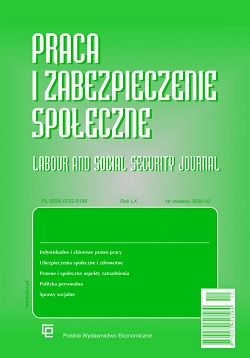
- JEL: K31 whistleblower protection in the Polish legal system in the perspective of the implementation of Directive 2019/1937 of the European Parliament and of the Council (EU) on the protection of persons reporting breaches of EU law - nodal problems (4-11)
The article discusses the key problems related to the implementation into the Polish legal order of Directive 2019/1937 of the European Parliament and of the Council of 23 October 2019 on the protection of persons reporting breaches of EU law, which introduces uniform rules for the protection of whistleblowers for the entire European Union. The ineffective expiry of the deadline for its implementation provided for in the directive has contributed to the assessment of the nature of the provisions of secondary EU law contained therein, which may also be relevant in subsequent disputes related to potential allegations of incorrect transposition of the legal act in question. The problem of the proposed scope of the subject matter of notification, which determines the protection, contained in the draft act on the protection of persons who report violations of the law, was also analyzed, which does not take into account the international obligations of the Republic of Poland, emphasized in the jurisprudence of the European Court of Human Rights. The considerations in the article also concern the issue of the deficit of the legal protection measures for whistleblowers planned in the act. - Legal mechanisms of protection of an employee performing on-call work on the example of selected European countries in the perspective of the implementation of Directive 2019/1152 into Polish legislation (12-20)
The aim of the article is to analyze the legislation of selected European Union countries in the context of the implementation of Directive 2019/1152. The author focuses on those provisions of the directive that are intended to improve the standards of protection of on-call workers. It also tries to formulate conclusions regarding the implementation of the directive into the Polish legal system. - Investment efficiency of supplementary pension plans and macroeconomic factors (21-30)
The adequacy of the pension system depends on the effectiveness of the pension plans in which individuals participate. The article examines which macroeconomic factors influenced the investment efficiency of voluntary pension funds and employee pension funds in Poland. It was checked whether there were any dependencies between the rate of return of the above-mentioned plans and selected macroeconomic indicators. It was found that nominal and real rates of return of employee pension funds are positively correlated with the value of the WIG index, and the highest nominal rates of return were achieved by voluntary pension funds characterized by both a more aggressive investment portfolio and better management competences. The results of the analysis provide valuable conclusions for the social policy in the area of defining the investment policy of pension plans in order to more effectively achieve the social and economic goals set for the pension system. - The mobility package and regulations on working time of international transport drivers (31-36)
The road transport sector in Poland is an extremely important part of our economy. The changes introduced in several stages as part of the mobility package will largely affect the economic situation of Polish carriers. This package contains a number of regulations relating to both the competitiveness of transport companies in the European Union and the improvement of drivers' working conditions. The aim of the article is to present new regulations concerning the working time of international transport drivers resulting from the mobility package. - Age bridging pension: Removal of the condition for termination of employment as an example of incorrect reception of the legal structure (37-44)
The author discusses the reasons and effects of the abolition of the termination of employment as of April 20, 2022 as a condition for acquiring the right to a bridging pension and replacing it with a structure of suspending the right to old-age pension , known from the national retirement pension. He points to a change which accidentally deprived some of the compensation for compensation, and in the case of the bridging pension, it did not significantly improve the situation of people who want to take advantage of it. Against this background, it proposes possible solutions and formulates requirements that the legislator should take into account in the future when registering legal structures. - Sexual harassment in the judgments of common courts (45-51)
Cases related to sexual harassment are among the least frequently reported, despite the regulations that have been in force for many years and enable them to claim damages on this account. The analysis of the judicature of common courts shows, however, that sexual harassment occurs in other cases, e.g. concerning unjustified termination of an employment contract, reinstatement or mobbing. The author reconstructs the way sexual harassment is understood and assessed by the courts, as well as the reactions of employers and the environment of people who have experienced this form of sexual abuse. - Voluntary sickness insurance for people conducting non-agricultural business activity - failure to pay the premium in full amount (52-55)
The author discusses the resolution of the Supreme Court caused by the discrepancy in the jurisprudence regarding the assessment of the legal consequences of paying the contribution for voluntary sickness insurance for a person who conducts non-agricultural activity in an incomplete amount (in the amount lower than due).
Praca i Zabezpieczenie Społeczne (Work and Social Security) - the whole list






